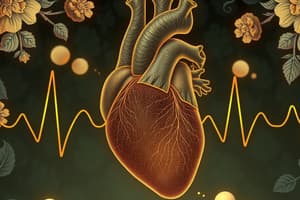Podcast
Questions and Answers
Explain the role of beta blockers in the treatment of abnormal heart rhythms and their potential adverse effects.
Explain the role of beta blockers in the treatment of abnormal heart rhythms and their potential adverse effects.
Beta blockers block beta-adrenergic receptors, leading to a reduction in heart rate, cardiac output, and blood pressure. Potential adverse effects include fatigue, bradycardia, and bronchospasm.
Describe the physiological factors involved in heart muscle contraction and the regulation of muscle stimulation and relaxation.
Describe the physiological factors involved in heart muscle contraction and the regulation of muscle stimulation and relaxation.
Heart muscle contraction is initiated by the sequential action of sodium ions ($Na^+$), calcium ions ($Ca^{2+}$), and potassium ions ($K^+$), which regulate muscle stimulation and relaxation.
What is the normal range for heart rate, and how is it commonly measured?
What is the normal range for heart rate, and how is it commonly measured?
The normal range for heart rate is 60-100 beats per minute (BPM) in a regular rhythm, commonly measured as the pulse.
Define stroke volume and state its average volume per beat.
Define stroke volume and state its average volume per beat.
Explain the dromotropic effect and how it relates to the speed of conduction of the heart's beat.
Explain the dromotropic effect and how it relates to the speed of conduction of the heart's beat.
Flashcards are hidden until you start studying
Study Notes
Cardiovascular Medications and Heart Physiology
- Different types of cardiovascular medications are used to treat various heart conditions, including hypertension, congestive cardiac failure, arrhythmias, and ischemic heart disease.
- Examples of these medications include beta blockers, ACE inhibitors, calcium channel blockers, diuretics, digoxin, and potassium channel blockers.
- Each type of medication has specific actions and important side effects that need to be considered, with nursing considerations being essential for patient care.
- Heart physiology involves three interdependent systems: circulatory, conduction, and coronary, all of which are crucial for efficient heart function.
- Heart muscle contraction is initiated by the sequential action of sodium ions (Na+), calcium ions (Ca2+), and potassium ions (K+), which regulate muscle stimulation and relaxation.
- Heart rate reflects the firing of the sinoatrial (SA) node and is commonly measured as the pulse, with a normal range of 60-100 beats per minute (BPM) in a regular rhythm.
- Stroke volume, the amount of blood pumped by the ventricles per beat, has an average volume of 60-80ml per beat.
- Dromotropic effect refers to the speed of conduction of the heart's beat, with positive dromotropic effects increasing conduction and negative ones decreasing conduction.
- Arrhythmias are any deviations from normal sinus rhythm, often caused by abnormal spontaneous initiation of an impulse.
- Sinus rhythm (SR) is the normal rhythm of the heart, while medications such as beta blockers, potassium channel blockers, and calcium channel blockers are used to treat abnormal heart rhythms and prevent irregularities.
- Beta blockers, for example, block beta-adrenergic receptors, leading to a reduction in heart rate, cardiac output, and blood pressure, with potential adverse effects including fatigue, bradycardia, and bronchospasm.
- Other classes of medications, such as potassium channel blockers, calcium channel blockers, and unclassified drugs, have specific actions, contraindications, and adverse reactions that need to be considered in clinical practice.
Studying That Suits You
Use AI to generate personalized quizzes and flashcards to suit your learning preferences.




